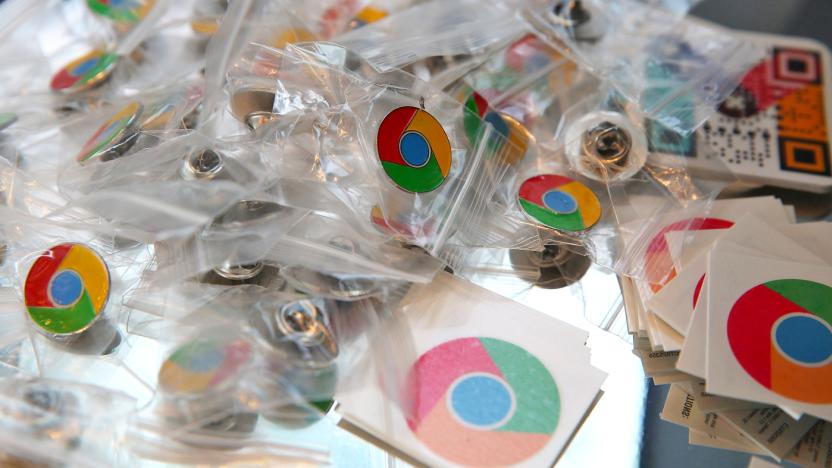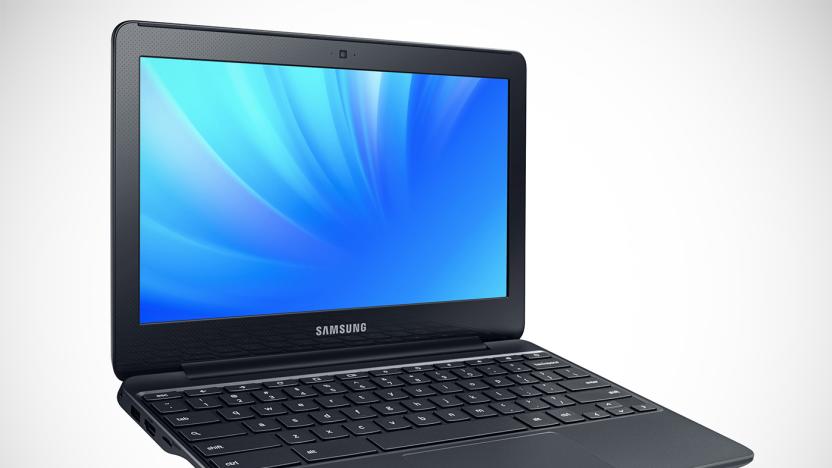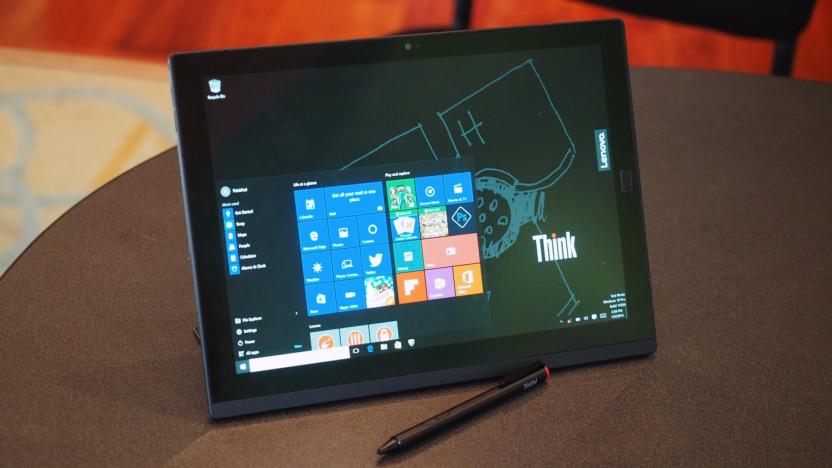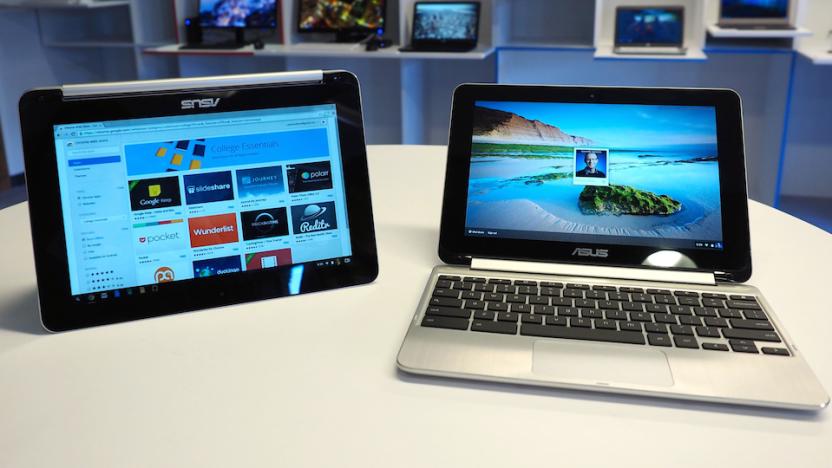ChromeOS
Latest

Acer Chromebase is an all-in-one video conference system
We first met Acer's Chromebase at CES 2016, but that one wasn't loaded with Google's enterprise software like this version is. The company's new Chromebase for meetings is a dedicated video conference system that tracks schedules and supports 25-person Hangouts sessions, even with people with no Google accounts. Unlike Chromebox for meetings, which the big G launched back in 2014, this is an all-in-one device that already comes with a display. Google says getting the computer up and running is as easy as plugging it in and connecting it to a network.

Google is giving Chrome's app launcher the axe
Folks who favor launching Chrome apps from their dock on OSX or the taskbar on Windows rather than through the browser itself are bound to be disappointed by today's news. Google has announced that the Chrome App Launcher will be removed from the Apple, Linux and Microsoft operating systems. It's still safe on Chrome OS, though.

The humble Samsung Chromebook 3 costs $200
We didn't know how much Samsung's Chromebook 3 would cost back when the company covertly debuted it at CES (it feels like so long ago, really), but that's changed. This diminutive laptop will set you back $200 and it's available through Adorama according to Liliputing, although it's currently on backorder. As a refresher, those two Benjamins will get you an 11.6-inch, 1366 x 768 display, 16GB of internal storage, 2GB of RAM, Intel's Celeron N3050 Braswell processor and 802.11 ac WiFi. That model promising 4GB of RAM is slated to hit sometime in the future.

Samsung's latest CES surprise is the humble Chromebook 3
Oh, what's that? You thought Samsung unveiled all its new notebooks at its press conference earlier today? Yeah, so did we — either way, Samsung just announced the brand new Chromebook 3 with hardly any fanfare, and not much in the way of juicy details.

Acer adds a semi-rugged $180 model to its Chromebook line
Acer's almost certainly the most prolific ChromeOS supporter. It's brought Google's operating system to a wide range of devices over the years, including 15-inch laptops, convertibles and giant all-in-ones. It's going back to basics today, though, with a simple addition to its Chromebook 11 line. Named the CB3-131, it's a low-end machine with an 11.6-inch 1,366 x 768 display, an Intel Celeron processor and a choice of 2GB or 4GB of RAM (and 16GB or 32GB storage). Rounding off the spec sheet are dual-band 802.11ac WiFi, HDMI out, USB 3.0 ports, an SD card reader and a touted 9-hour battery life.

Lenovo's ThinkPad X1 line adds OLED and a Surface rival
Lenovo's ThinkPad X1 Carbon must still be a hit with the pro laptop crowd, as the PC maker is unveiling no less than three ThinkPad X1 models at CES... and it's shaking up the formula in the process. The headliner is the ThinkPad X1 Tablet (above), which takes a clear stab at the slate-plus-keyboard concept made popular by Microsoft's Surface line. The detachable keyboard and optional stylus are the main hooks, but Lenovo is also introducing unique modules that change the role of the 12-inch machine. A $149 productivity module gives you 5 hours of extra battery, extra ports and wired docking, while a similarly-priced 3D imaging module captures objects. You can even get a $279 projector module, in case you need to make an on-the-spot presentation.

ASUS Chromebit review: Turn any display into a Chrome OS machine
If you've got some spare time, search for the words "Android dongle" on eBay -- your screen will be filled with little, Android-powered HDMI doodads that purport to make your dumb TV smart. But what about Chrome OS, Google's other operating system? For years, it lived most prominently on notebooks, but the new $85 Chromebit from ASUS is Google's attempt to give Chrome OS even more of a life beyond the laptop. Got a spare monitor with an HDMI-in port? Or an HDTV that could stand to be smarter? Just pop in the Chromebit and voilà: Your dumb display is now a Chrome OS computer. It's not that powerful, and it's far from perfect, but the Chromebit is just cheap and just good enough to find a home in classrooms and tinkerers' dens.

Google swears it won't phase out Chrome OS
That talk of Google merging Android and Chrome OS, effectively killing Chrome OS as you know it? Google would rather that you forget about all that. In a follow-up to its early rebuttal, the search firm acknowledges that it's working on ways to "bring together" the two platforms, but insists that there's "no plan to phase out" Chrome OS. The web-focused software is still popular in classrooms and offices, Google says, and there are plans to upgrade it with everything from a more substantial Material Design makeover to a new media player. There are "dozens" of Chromebooks launching in 2016, the company adds.

Android and Chrome OS may be combined as early as next year
For years, people have wondered if Google would merge its Android and Chrome operating systems, and the company has steadfastly held to them important but distinct pieces of its strategy. That might be changing: The Wall Street Journal is reporting that Google has been working for two years to merge Chrome OS and Android. The results of that unified operating system is expected to be officially released to the public in 2017, but we may see an early version as soon as next year. Update: While some have reported Google might "kill" ChromeOS, the company seems to still have some kind of dual-strategy in mind and has disputed that interpretation. As the Senior VP of Chrome OS, Chromecast and Android Hiroshi Lockheimer probably knows the the most about each project's potential fate, and he tweeted tonight that "we are very committed to Chrome OS."

HP's refreshed Chromebook 14 gets a price drop and longer battery life
No, they're not as wacky as that special edition Star Wars laptop, but Chromebooks are still likely to make for popular gifts this holiday season, given that they're cheap, compact and come in fun colors. Unsurprisingly, then, HP's just refreshed its 14-inch Chromebook ahead of the Black Friday stampede, cutting the price by $50 and promising longer battery life. In particular, the Chromebook 14 is now rated for nine hours and 15 minutes with a 1,366 x 768 display, up from eight hours in the last-gen version. HP also moved from an NVIDIA chip to an Intel Celeron N2840, which could in theory yield faster performance in some areas, though it's a shame there doesn't appear to be an option to configure it with more than 2GB of RAM. There's also a 1080p screen option; just don't expect the battery life there to be quite as long.

Dell Chromebook 13 review: Chrome OS without compromise
I've long wondered why it was so hard to find a nice Chromebook. Sure, the Pixel may be an exemplary laptop, but it's near-impossible to recommend that anyone spend $1,000 on a Chrome OS device. But most cheaper Chromebooks compromise your computing experience with bad displays, uninspired hardware or internals that just can't keep up. But there's change in the air. Last year, Toshiba and Samsung both released 13-inch models that both moved the bar forward, but they also each had some serious flaws. Now Dell is trying its hand with its first 13-inch Chromebook, a follow-up to the successful 11-inch version it released last year. It may be marketed toward business users, but in a lot of ways this is a Chromebook that anyone who believes in the promise of Chrome OS could love. That quality comes at a cost, though: The entry price for Dell's Chromebook 13 is $429. Does this Chromebook justify that bigger investment?

Toshiba's retooled Chromebook 2 arrives in October, starts at $330
Toshiba has announced an upgraded version of its Chromebook 2, which is scheduled to ship next month. Compared to last year's, the company's new Chrome OS laptop will be available with 5th-generation (Broadwell) Intel Core i3 or Celeron processors -- both are geared toward performance, so you can expect this machine to be much snappier than its predecessor. Additionally, the refreshed Chromebook 2 features a backlit LED keyboard for the first time. What does carry over from the previous model is that great 13.3-inch, 1080p IPS display, an HD webcam, two USB ports (3.0, 2.0) and the option to add up to 4GB of RAM. Battery life rating, meanwhile, continues to be about nine hours, but hopefully those fresh processors will make Toshiba's Chromebook 2 last longer than before. It'll be available in October for $330 and $430 for the Celeron and Core i3 models, respectively.

ASUS Chromebook Flip review: small, solidly built, well-priced
I'm sick of reviewing Chromebooks. What was once the source of fierce debates about the future of computing is now a commodity: Most models have the same specs, the same internals and more or less perform the same. There are a lot of them, and most aren't particularly good or particularly bad. They're forgettable; unremarkable. That cranky preamble aside, I did want to test the Chromebook Flip. This machine, made by ASUS, is notable on a few counts. With a 10-inch screen, it's one of the smallest around, even if it does hearken back to the days of the netbook. It's one of the few with a 360-degree rotating touchscreen. The build quality is better than most, thanks to an all-metal chassis. The battery life is longer too, at 10.5 hours. Lastly, it's cheap for what it is: just $249. Yes, there's a catch -- several, even -- but all told, I recommend it anyway.

Here's how Google checks for lag on your Android phone
Yes, Google hates lag on smartphones as much as you do -- enough so that the search giant has a robot dedicated to spotting that delay between your finger input and what happens on screen. Meet the Chrome TouchBot, an OptoFidelity-made machine that gauges the touchscreen latency on Android and Chrome OS devices. As you can see in the clip below, the bot's artificial digit pokes, prods and swipes the display in a series of web-based tests (which you can try yourself) that help pinpoint problems in both code and hardware. This isn't the only gadget monitoring device lag at Google, but it could be the most important given how much the company's software revolves around touch. Don't be surprised if this automaton boosts the responsiveness of Mountain View's future platforms.

Skype's web chats now work on your Chromebook
As of today, you no longer need a relatively pricey PC to chat on Skype when you'd rather not break out your phone -- a cheap-and-cheerful Chromebook will do the trick. In addition to expanding the Skype web beta worldwide, Microsoft has introduced instant messaging for both Chrome OS and Linux users. It's not the video or voice calling you're looking for, but it means that you can stay in touch with Skype-obsessed family members without having to switch devices or services. The messaging platform is based on the open, video-capable WebRTC standard, so don't be surprised if you're eventually holding face-to-face Skype conversations on that Chrome machine.

Viber's calling and messaging app launches on Chromebooks
In order for Chrome OS to succeed, Google needs all the support it can get from developers. Hardware companies are certainly doing their part, namely by offering Chromebooks to people at affordable prices. That's why it's important when a popular service such as Viber launches on the platform, like today. Now users can start using the app to communicate with friends or family directly from their Chromebook, just as they would on iOS, Android or Windows Phone. Not only can you send text and picture messages, but also make phone and video calls to your contacts. It's free too, which comes in handy if you're trying talk to people across different countries.

Chrome OS gets a new launcher and more Material Design
Early adopters have had access to a redesigned Chrome OS launcher since last month. Now, Google is making that feature available to all users of its web-based operating system. Today's fresh, stable update to Chrome OS also comes packed with a number of Material Design elements, bringing a new look to the Files app and the default typeface. Just as well, there's an updated calculator app, support for password-protected zip files -- plus, of course, the customary bug fixes and security revisions. So expect to see changes the next time you boot up your Chrome OS machine, some visible, others not so much. Either way, rest assured they are for the better, especially the Google Now-equipped Chrome Launcher 2.0.

Acer's Chrome OS all-in-one is the first with a touchscreen
Intrigued by the idea of an all-in-one Chrome OS computer, but were hoping for something a little more exciting than the likes of LG's Chromebase? You've got it: Acer has just unveiled its own Chromebase. The system has a 21.5-inch 1080p display like its LG rival, but it's the first to include a touchscreen for those times you want to share input (or just can't be bothered to reach for the mouse). It's also running on NVIDIA's Tegra K1 chip rather than the speedier Intel Celeron of its competitor, although that's not necessarily a bad thing if you're looking for a quiet, low-powered PC. Whether or not it has the lower cost to match is up in the air, however. Acer ships its Chromebase to Asia and North America in the second quarter of the year, but it hasn't divulged pricing just yet.

Google reveals budget Chromebooks including a $249 ASUS convertible
Ladies and gentlemen, get ready for some new Chromebooks. Yep, Google has just announced four new Chrome OS laptops, all of which lean toward the budget-friendly end of the spectrum. They are the ASUS Chromebook Flip, the ASUS Chromebook C201, the Hisense Chromebook and the Haier Chromebook 11 (This also comes in an educational version dubbed the 11e). Though it's the priciest model at $249, the most notable one by far is ASUS' Chromebook Flip. Not only is it the slimmest of the bunch with a thickness of only 15mm, it has a 10.1-inch touchscreen IPS display that can be flipped (hence the name) 360 degrees around.

Google puts Chrome OS on your TV with its own HDMI stick
Google has unveiled a whole new type of Chrome device, and it's one that can fit in your pocket. It's called the Chromebit, and it's essentially a Chromebook crammed in a dongle. This tiny little package contains a Rockchip 3288 SoC, 2GB of RAM, 16GB of eMMC memory, a USB 2.0 port, WiFi 802.11 ac support, Bluetooth 4.0, a Smart Ready controller and an ARM Mali 760 quad-core GPU. Just like Intel's Compute Stick, all you have to do to get the Chromebit working is to attach it to any display with a HDMI port, and voila, you've turned it into a computer. Unlike the Intel stick though, the Chromebit's HDMI end actually swivels around so that the dongle doesn't stick out in an unsightly way behind a monitor or TV. As for battery life, well, Google says it doesn't really know that just yet as the product is still in testing. Google promises that the Chromebit -- the first is made by ASUS -- will retail for less than $100. It'll be available in either silver, blue or orange and will be out later this summer.








